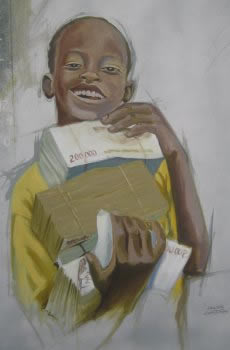Why Owen and not Yvonne?
Thursday, January 27th, 2011 by John EppelIn her obituary of Yvonne Vera, Ranka Primorac wrote: “The most courageous among them [her other books] is The Stone Virgins, the first work of fiction that openly exposes and condemns the government sponsored violence [Gukurahundi] against civilians in Independent Zimbabwe.” Primorac goes on to praise its “stylistic mastery and political bravery.” Yet The Stone Virgins has never been banned; Vera (who, curiously, received the Tucholsky Award of the Swedish PEN for a writer in exile or undergoing persecution) never went into exile, was never persecuted, never even harassed. The novel was published in 2002 when the government’s policy of re-crafting and subverting the law to support its ideology of “patriotism” was in Operation [upper case deliberate]. How come they left her alone? I can think of two reasons: first, that Primorac is wrong about Vera’s political courage; second, The Stone Virgins is a novel written in turgid English, and was never likely to influence the restless povo, for most of whom books are unaffordable, and English is very much a second or third language.
By blurring distinctions between dissidents, pseudo-dissidents, and soldiers; between war and massacre; by the timing of the atrocities described in the novel, Vera creates self-protecting ambiguities. For example, the brutal murder of the shop owner, Mahlatini takes place in 1982, before the Fifth Brigade was officially mobilised. His killers are called “soldiers”. Just before he dies, the author puts a suggestive thought in his mind: “He did not want to see who was killing him, just in case he recalled something about the eyes, the forehead, the gait of this man.” Just in case his killer was a local?
The saintly man, Cephas, associated with the mazhanje (umhobohobo) fruit of the eastern highlands, is Shona (his tagged on surname, Dube, notwithstanding); the diabolical man, Sibaso, associated with the marula fruit of Matabeleland, is Ndebele. Dissidents and pseudo-dissidents did commit atrocities, some hundreds, mainly against whites and so-called sell-outs; but the Fifth Brigade, targeting innocent rural folk, killed, raped, and maimed tens of thousands. Vera’s choice of perpetrator in this context seems somewhat skewed. No wonder she wouldn’t allow copies of Breaking the Silence, Building True Peace, to be displayed in the Art Gallery shop when she was the Director – the same art gallery where Owen Maseko’s exhibition remains sealed off to the public. So, Ranka Primorac is wrong – there is nothing in The Stone Virgins that” openly” condemns and exposes Gukurahundi. On the contrary, it is full of lyrical self-censorship.
The second reason why the authorities might have left Yvonne Vera alone recalls the words of the writer, Stanley Nyamfukudza: “One of the best ways to hide information in Zimbabwe is to publish it in a book.” The Board of Censors tends to overlook the written word because the vast majority of people in this country have little access to books, especially fictional books. The visual arts, township drama, and performance poetry are another story! The Kenyan author Ngugi wa Thiongo was imprisoned not for his novels in English but for his plays in Kikuyu. The authorities don’t want the masses to get too excited.
So, why Owen Maseko? Again, I can think of two reasons: first, his exhibition is courageous to the point of recklessness in its exposure of what has now been officially classified as genocide; second, as a visual artist his work is immediately accessible to the restless povo. It speaks a universal language.










